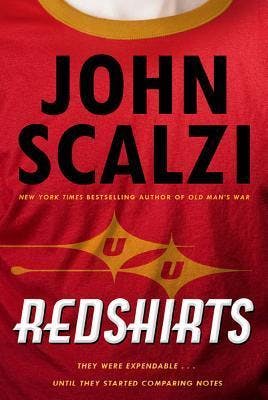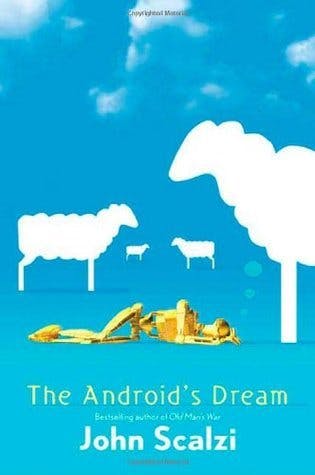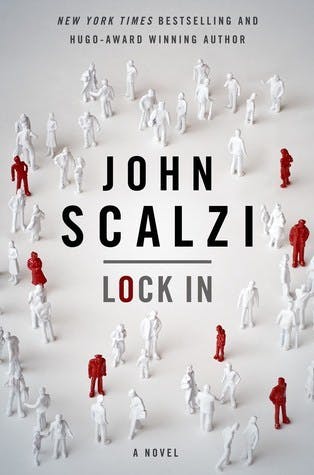Hey, Mom! Talking to My Mother #1055 - Scalzi interview about diversity in SF
Hi Mom,
Going into a sort of vacation and holiday mode for the next three days. Memorial Day is happening. So I am setting up shares that are ready to roll unless I find myself with a magical pocket of time and jump on something.
I have had this article hanging around for a couple of years. It's time to share. It's not like the content Scalzi wrote is no longer true.
FROM - https://www.inverse.com/article/9836-john-scalzi-thinks-nerd-gatekeeping-is-complete-nonsense-asking-the-prophet
Filed Under Ask a Prophet & Science Fiction
In Asking the Prophet, we use our alien probes to pick the brains of sci-fi and speculative fiction writers. This week, we spoke to sci-fi heavyweight John Scalzi about spaceships, meat-and-potatoes sci fi, social media, and nerd gatekeeping.
How do you get your ideas and meld them into a plot that feels plausible?
Getting ideas is not the problem, it’s telling which ideas are worth writing about and which ones are not. That’s the real key. Any time I have an idea, I don’t immediately write it down. I just let it roll around in my brain with all the others. They sort of have an idea thunderdome up there.
The ones that survive over a few months are the ones I start thinking about more seriously. I come up with tons of ideas, but most are — generally speaking — crap. For example, if I come up with an idea before bed, I don’t write it down before I go to bed. If I wake up and I can’t remember that really cool idea I had, then clearly it wasn’t that cool. On the other hand, if I have something that lasts in my brain for weeks and I’m thinking about it when I’m not doing anything else, then it’s something worth following up. With regard to plausibility, I don’t worry about that too much. If it’s a good enough idea, then I’ll start thinking about it more intensively to see if it’s something that can be made probable in the story.
Do you read a lot of science publications or articles? How do you keep up with information to spark those ideas?
Most of my job is sitting in front of my computer reading shit, so information comes from lots of different places. It comes from science, from pop culture or what people are talking about. I have a serious idea I’ve turned into one of the books in my book deal that came from a music video. The video itself is not particularly science fictional, it’s just one element stuck in my brain and rolled around until I eventually began to build a story around that.
What video was it?
It was from two or three years ago. The specific band escapes my brain right now. The video itself wasn’t particularly memorable, it was that particular element of it.
Is there anything related to any new scientific discoveries or technological advancements that has fascinated you recently?
Some of the stuff I’m finding interesting is propulsion and spacecraft. There’s a particular engine that is kind of an inertialess drive. It doesn’t have a whole lot of fuel, and it vibrates and pushes the drive forward. It was really interesting because the whole idea is not supposed to work and somehow it does — what does it mean? It’s under peer review and it may or may not actually pan out, but in the meantime, it’s something to be thinking about: If you were going to do that in science fiction, how would you do it and what does it mean?
You’re a very active member of the sci-fi community, but you’re also outspoken about its flaws, most notably on your blog and Twitter:
And you’ve also talked a lot about the idea of gatekeeping, which is basically what the Sad Puppies Hugo Awards fiasco was about. What’s your takeaway from that? Where do you see the genre going in the future?
The major flaw of the Sad Puppies was not that they loved their particular brand of science fiction, but that they believed that it was somehow being crowded out of the marketplace by other, more politically correct stuff. That’s complete nonsense.
We’re in a position where the market for science fiction and fantasy is wide and deep. There is enough out there in terms of both writers and reader interest that there’s space on the table for everybody — commercially, and likewise in recognition and awards. A lot of the agitation simply has been the idea of science fiction has to be these particular things and has to address these particular interests and has to do it in this particular way. The response to that is, “Who made you the king of science fiction? Who’s the boss of science fiction or fantasy?”
At the end of the day it’s, “Here is a writer,” this writer comes from a specific background, has specific things to say, puts out their stuff, it finds an audience, and you move forward from there. Does it have to conform to what has come before? No! Why should it? It’s a speculative genre!
People like Kameron Hurley are not being subsidized. This is America; we don’t believe in subsidizing our arts. They’re in the stream of commerce. People are buying it and sharing it and telling people they love it. What we’re seeing is both the expanse in the readership of science fiction and fantasy and the acceptance of the idea that it just doesn’t have to be one type of thing. If you are there demanding that science fiction has to be exactly this way, you are the proverbial king holding back the tide. It’s just not going to work.
Science fiction and fantasy is becoming more diverse in who writes it and what is represented — and I, for the life of me, cannot see what the problem is. I mean, come on. I write meat-and-potatoes classic science fiction. I’ve got spaceships, I’ve got lasers, I’ve got aliens. To suggest that there’s not a market for that type of science fiction is absolutely ridiculous. I’m doing great!
It just also happens that there’s lots of other cool stuff out there that is not like the sort of stuff that I write, and I think that’s great. Not everybody is going to be interested in the stuff I write — and not everybody should be. There should be science fiction and fantasy of all genres. It should be as inclusive as possible about the possibilities of the future and the possibility of alternate worlds and alternate setups. Otherwise, it’s fundamentally missing the point of what science fiction and fantasy can achieve.
Do you think the modern sci-fi writer has to be as outspoken and plugged in as you are to succeed, or is it a personal choice?
People often say, “The only reason that John Scalzi is on social media is to help his career.” What I like to remind people is that I had a blog seven years before I actually had my first science fiction novel published. I was a newspaper columnist 12 years before I had my first novel published. The reason I’m on social media is because it’s a format that’s congenial for me in terms of my own personality. I don’t think everybody who writes needs to be on social media. Quite frankly, a lot of people don’t seem to enjoy it and aren’t really good at it. If you’re one of those people, then you’re not going to be doing yourself any favors being on social media.
The fact of the matter is, there are many ways for writers to promote their work and their career. Not everybody has to do it the same sort of way. China Miéville is one of the most talked-about writers of speculative fiction around, and he’s very rarely on social media; I don’t think he even has a Twitter or Facebook account. Ultimately it comes down to, who are you as a person? Are you going to have fun on social media? Are you going to freak out and think if you’re not promoting something all the time, you’re doing something wrong? If it fills you with apprehension about what you have to perform — then the answer is maybe you shouldn’t be on it.
Which authors do you read in your spare time? Who are your influences?
China [Miéville] doesn’t influence me — because there’s no possible way I could write like him; I read his stuff and enjoy it specifically because I don’t have to sit there and think about what can I steal from him — but he’s definitely someone whose talent I deeply admire. Neal Stephenson is someone who was an influence on me. His first chapter of Snow Crash is one of the best first chapters in science fiction and fantasy, hands-down. That certainly reminded me, when I started doing my own writing, to front-load your stuff. Don’t make people wait three chapters to get to the good stuff. Give them the good stuff right up front, because if you give it to them early, they’re going to sit with you through other parts of the story where you might have to slow down and pace yourself.
But these days, I don’t read a whole lot of people for the influence. Partly because I’ve got my own things I need to be doing. I frequently read people who have absolutely nothing to do with what I’m writing myself. N.K. Jemisin’s new book The Fifth Season is absolutely terrific and I would be very surprised if it’s not shortlisted for every possible award in the next year. I don’t read her to be influenced by her; I read her because she’s a good read and I admire how she writes. Am I consciously taking stuff from her? No. But on the other hand, just like any other craft person, when you are looking at something that someone of equal or more talent does, you’re definitely saying, “Oh, that’s how she does it. That’s cool, I’ll have to remember that.”here's another perspective on "Nerd Gatekeeping"
from - http://www.geekmelange.com/2014/01/no-one-can-deny-you-entry/
No One Can Deny You Entry to Geekdom, But Some Can Make It Really Hard to Get Through the Door First
By now it’s pretty clear where I stand on the idea of gatekeeping for geek culture – those gates should be open and everyone welcome inside. For the most part, I like to think most geeks and nerds want there to be more people to play with and share their excitement and enthusiasm with. Calling out gatekeeping for what it is helps keep those doors open, and it doesn’t hurt at all when people whose social privilege can allow for their voices to carry farther speak up in support.
John Siracusa’s piece, “The Road to Geekdom,” has some lovely sentiments about what geekdom has meant to him and why it should be open to everyone. However, I have a slight quibble with Siracusa’s conclusion, which I think is well-intentioned, but missing a larger point about how that entryway to geekdom can be harder to step through for people who aren’t part of the perceived majority (read: straight white cis men):
(Bolding mine for emphasis)
“Anyone trying to purposely erect border fences or demanding to see ID upon entry to the land of Geekdom is missing the point. They have no power over you. Ignore them and dive headfirst into the things that interest you. Soak up every experience. Lose yourself in the pursuit of knowledge. When you finally come up for air, you’ll find that the long road to geekdom no longer stretches out before you. No one can deny you entry. You’re already home.”
I understand what Siracusa is trying to say – that it’s a shame to let someone else’s prejudice prevent you from enjoying the things you love and being part of the communities you want to be in. It is a shame, and were geekdom a level playing field, it would be a lot easier to ignore the naysayers and gatekeepers and be part of the fandoms you love. The problem with this conclusion (and it’s one that I’ve seen often and heard repeatedly) is that it rests on the assumption that all geeks and nerds face the same obstacles entering geekdom. The intention of the “just ignore it and do what you want” advice is well-meaning, but it studiously ignores the fact that geekdom isn’t a level playing field, which is precisely part of the gate-keeping issue in the first place. Just ask anyone who’s ever been a woman, a person of color, or LGBTQ in fandom, at cons, in gaming, in comics, at the movies, or any other kind of geeky, nerdy gathering.
Thanks to how normalized different forms of discrimination have become, there are people who do have power over determining who gets in the gates, even if they don’t know they’re exercising it. The active gatekeepers may not be able to actually lock the door, but they can make the room so toxic that staying isn’t an option. Anyone who’s ever had to deal with textbook Derailing for Dummies responses when trying to point out how words and actions are problematic and making an environment not all that welcoming knows how quickly fighting to open that door can become too tiring to continue, and your best option is to leave.
Further complicating matters is that one can contribute to that toxic atmosphere even if one doesn’t intend to. The problem with having social privilege is that it can insulate you from seeing how normalized and incessant problems like microaggressions and Othering are. For all intents and purposes, they don’t exist for you, which helps create the erroneous perception that the only thing keeping others from entering geekdom is themselves. After all, no one can legally bar someone from attending a con or an open-to-the-public event based on race, gender, sexual orientation or sexual identity, so what is really standing in the way?
Just ignore the casual bigotry, the claims that you’re going to ruin Doctor Who if the Doctor’s ever a woman, that scifi is being ruined by girl cooties and being told you just don’t understand what this fandom is about because you hold a different opinion. Why not be flattered being told that you’re not like those “other” silly fangirls, when people are surprised that you’re a black woman who cosplays (and nevermind the angry racial invective when you don’t cosplay a black character). Brush off being told that you’re overreacting because that guy was just being awkward hitting on you, being asked what’s the problem with booth babes and chainmail bikinis, and having people say that you’re not a “real geek” because you’re only here to be “con hot.” It’s not a big deal that movie studios think it’s “difficult” to make a Black Panther movie because they’d have to create Wakanda from the ground up (but haven’t had that problem with Asgard), that Wonder Woman’s being introduced as back up for Batman and Superman rather than in her own film (and hey, the woman they cast is just too skinny!), or that straight male fans complain that adding same-sex romance options in a game is “ignoring their main demographic.” None of that can actually stop you from entering geekdom and it’s a great place for everyone to be in – just hold your nose, close your eyes or stop up your ears if that’s what it takes to come inside and stay, right?
Dismissing or ignoring how much of a barrier institutionalized discrimination can still be for people in marginalized groups can have the unintended effect of putting them “at fault” if they can’t “get into geekdom” because if “no one can deny you entry”, if you’re not inside, it’s because you haven’t made the effort of entering. You can’t alter gatekeeping or other exclusionary practices and politics by pretending they’re not there. The implicit result of doing so denies and delegitimizes people’s experiences of discrimination and puts the onus to fix that exclusion on the people who are being excluded in the first place. Being able to think that fixing exclusion is as simple as not letting anyone stand in your way is a luxury that isn’t always afforded to many people who have been fighting against gatekeeping.
Do I want more people to come into geekdom and join me? Oh hell yes! I’d love more people to come on in and join the party, but inclusion in geekdom won’t happen without those who are already inside doing their part to keep those doors open, make it clear that everyone is welcome, and be willing to acknowledge and work on the problems that still exist. In place of Siracusa’s conclusion, I’d offer a slightly different take (my changes in bold):
“Speak up in support when others point out barriers to entry in Geekdom. Talk about why building fences and demanding IDs to entry is missing the point. Dive headfirst into the things that interest you and invite others along for the ride. Soak up and share every experience. Lose yourself in the pursuit of knowledge. When you finally come up for air, you’ll find that the long road to geekdom no longer stretches out before you alone, so share the lane. Don’t deny others entry to geekdom, offer your hand and invite them in. Work together to make geekdom a home for anyone who wants to be there.”
When someone’s been thrown out your house and told repeatedly that they’re not wanted and to go away, they’re not going to be all that inclined to blithely come right in and feel comfortable just because you say you’ve changed your mind. Open door policies aren’t enough – if we want people to be at home in geekdom, we have to put the effort into inviting them in and making them feel welcome, too. Because geekdom can absolutely be a fantastic place to share with others, if only we can make it so for everyone.
+++++++++++++++++++++++++++++++++++++++++++++++++++++++++++++++++++++++
+++++++++++++++++++++++++++++++++++++++++++++++++++++++++++++++++++++++
+++++++++++++++++++++++++++++++++++++++++++++++++++++++++++++++++++++++
Reflect and connect.
Have someone give you a kiss, and tell you that I love you, Mom.
I miss you so very much, Mom.
Talk to you tomorrow, Mom.
+++++++++++++++++++++++++++++++++++++++++++++++++++++++++++++++++++++++
+++++++++++++++++++++++++++++++++++++++++++++++++++++++++++++++++++++++
+++++++++++++++++++++++++++++++++++++++++++++++++++++++++++++++++++++++
- Days ago = 1057 days ago
- Bloggery committed by chris tower - 1805.26 - 10:10
NEW (written 1708.27) NOTE on time: I am now in the same time zone as Google! So, when I post at 10:10 a.m. PDT to coincide with the time of your death, Mom, I am now actually posting late, so it's really 1:10 p.m. EDT. But I will continue to use the time stamp of 10:10 a.m. to remember the time of your death, Mom. I know this only matters to me, and to you, Mom.








No comments:
Post a Comment